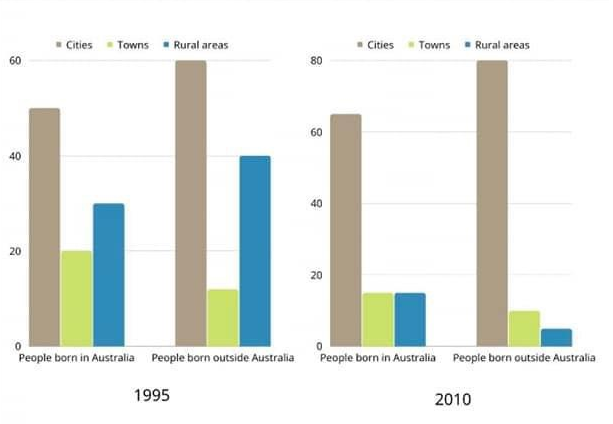[Jack H] Writing Practice Test 1308288
Task 1
You should spend about 20 minutes on this task.
The bar chart below describes some changes about the percentage of people were born in Australia and who were born outside Australia living in urban, rural and town between 1995 and 2010.
Summarise the information by selecting and reporting the main features and make comparisons where relevant.
You should write at least 150 words.

It can be seen from the two graphs that a major shift in population allocation occurred within the 15-year period from 1995 to 2010. In 1995, both groups of people shared a similar trend, with most people residing within cities, followed by rural areas and towns, respectively. However, the differences between places of accommodation are more significant within the population of people born outside of Australia. This is evident in the high range of approximately 50, as compared to a range of 30 in people born in Australia. Furthermore, these statistics reflect people born outside Australia's strong preference to live in cities or rural areas. While people born in Australia also preferred cities, statistics illustrate an evenly spread preference between towns and rural areas.
While most of the trends observed in the 1995 graph continued into 2010, a few drastic changes occurred. Both populations saw a 20% increase in preference for cities, reflecting a growing preference for cities. In contrast, preference for towns and rural areas significantly decreased, with the most significant shift occurring within the population of people born outside of Australia. This group saw a major decrease from 40% to approximately 5% in preference for rural areas, making rural areas the least desirable option for people born outside Australia.
Task 2
You should spend about 40 minutes on this task.
Rich countries often give money to poorer countries, but it does not solve poverty. Therefore, developed countries should give other types of help to the poor countries rather than financial aid. To what extent do you agree or disagree?
You should write at least 250 words.
More developed countries often attempt to support less fortunate countries by providing financial aid. However, this approach is not completely efficient at reducing poverty rates due to ramping corruption or resource mismanagement. Hence, it is believed that rich countries wanting to support other nations should provide them with other resources better suited to their specific needs. While I believe that financial aid plays a certain role in solving poverty, it is more important for developed nations to focus on what poor countries really seek.
First, it is widely known that developing countries often suffer from ramping corruption. Hence, monetary donations made to these countries may not make it to the people in need but rather to corrupted government officers. For instance, financial aid intended to improve the infrastructure of the targeted country may result in increased levels of corruption, consequentially making poverty worse in that nation. Furthermore, poorer countries often do not have enough skilled workers to handle the financial aid. Thus, the aid might be used inefficiently, resulting in undesirable progressions. Instead, developed countries can provide training and education for the population of poorer countries. This will enable them to support their country, ultimately leading to long-term wealth.
While financial aid is not the most effective approach when poverty is involved, it can provide a push in certain circumstances. For instance, countries that are currently in debt will greatly benefit from this approach, as the aid can be used to pay off the national debt, allowing them to shift the focus onto improving the nation instead of paying back debts. Moreover, financial aid will be of significant help to countries that suffer from wars or widespread natural disasters. The aid will allow them to recover quickly from such unprecedented events, potentially avoiding further plummeting into poverty.
Financial aid, despite being the easiest kind of support, is usually not the most effective approach when it comes to solving poverty in developing countries. This is largely because of a lack of resources management skills and potential corruption. However, monetary donations can still play a key role in supporting these countries as long as other resources are also provided.
Community’s feedback
Sorry! We couldn't find any contents.
Leaderboard:
| # | User | Score | Time | |
|---|---|---|---|---|
| Kento Nanami |  | 8.5 | 52:31 | |
| Nayef Alhajraf |  | 8.5 | 60:00 | |
| Ella Ruppo |  | 7.5 | 59:39 | |
| 4 | chengxi yu |  | 7.0 | 00:00 |
| 5 | avin chui |  | 7.0 | 59:11 |
| 6 | 癫 火 |  | 7.0 | 59:51 |
| 7 | Li Xuefeng |  | 6.5 | 03:46 |
| 8 | Chanisara Wongkongsang |  | 6.5 | 56:37 |
| 9 | Dan H |  | 6.0 | 50:41 |
| 10 | Carlo Di Giacomo |  | 6.0 | 60:00 |



